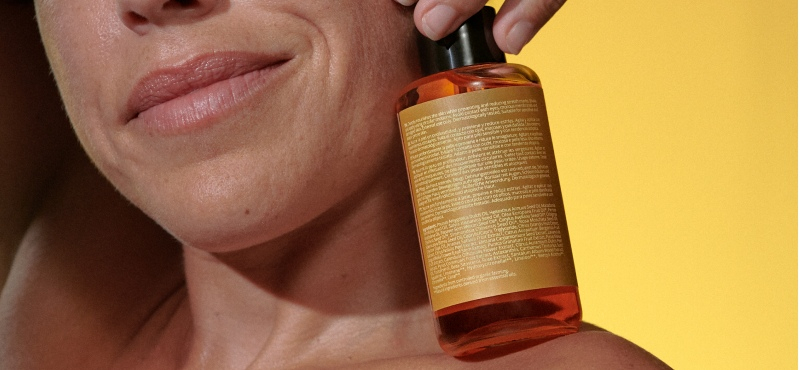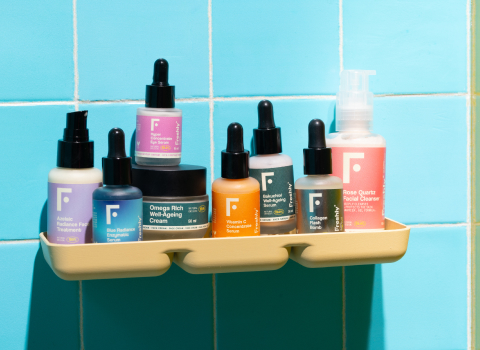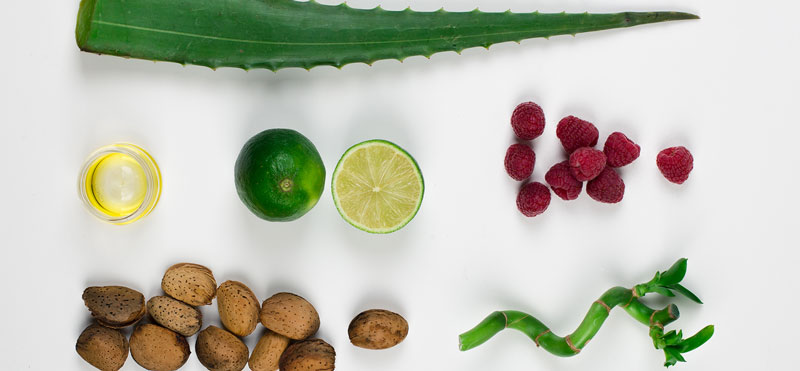Body oil for stretch marks and scars 100/200 ml
What is the INCI? Discover everything about the ingredients in your cosmetics

Here are your essentials
for making it this far
Do you know which ingredient is in almost all cosmetic products? It might surprise you; it's water. And not just that, it often serves as the main ingredient in most of them, accounting for more than 70% of the formula. And you might wonder, why? Water helps to purify the body, hydrate, and enhance the effect of other active ingredients. It's used to dissolve soluble ingredients, or mix some active principles and even preservatives. Moreover, water provides the skin with key components important for the protective barrier (sebum and water)
How can I know if my cosmetics contain water or if it's one of their main ingredients? Quite simple, by reading the INCI And what's that?
What is the INCI?
The INCI is the list of ingredients that are included in a cosmetic product. INCI stands for International Nomenclature Cosmetic Ingredient. We find it on the back of our products' labels, headed by the word: Ingredients.
Interesting point! The ingredients listed appear in descending order according to their quantity, meaning, the first listed is the most abundant. This information is useful to know which ingredients in the list are in higher or lower concentration. Also, these ingredients usually appear in Latin or English.
For example, in the case of water, it will appear as "Aqua", check your cosmetics and you'll see how it appears in the first positions – try it! Another example, in the case of aloe vera, it would appear as "Aloe Barbadensis Leaf Juice".
What kind of ingredients does the INCI include?
Ultimately, a cosmetic formula is like a cooking recipe, where various ingredients come into play to achieve the desired texture, aroma, active ingredients, hydration, function, and preservation. Therefore, the choice is to look for those ingredients that, when mixed, allow us to achieve the recipe we are looking for.
If we use another example, also related to food lol, we just have to think about the list of ingredients of any food we buy in a supermarket, have you ever stopped to read the label and its ingredients? Well, you can do the same with your cosmetics, in the end, it's about what your body and hair "drink" or feed on, don't you think?
But first... What is an ingredient?
An ingredient is a substance that is part of the composition of a cosmetic product, and it can be classified according to different criteria:
- Origin: animal, plant-based, mineral, biotechnological, synthetic
- Function: active, emollient, humectant, occlusive, surfactant

Let's dive deeper into the INCI of a cosmetic product. In a cosmetic formula, we basically find 5 families of ingredients.
- "Tool" used to dilute or mix the product's ingredients. Depending on their proportion, in natural cosmetics, these can be water, glycerin, and various plant-derived oils. The latter two also provide benefits as actives.
- Function of the product. Depending on whether it is a shampoo, a body cream, or any another product, the type of ingredient will vary. In the case of shampoo, it would be surfactants (ingredients that create foam) or in a cream, it would be emulsifiers or thickeners (ingredients that generate cream texture).
- Active ingredients. These are the ingredients you add to the formula to provide benefits to the skin or hair, that is, those that act so we can see the effects we're looking for (for example: smooth, luminous, even skin...) In this family, in the case of natural cosmetics, all plant extracts, algae... many of them obtained biotechnologically (*We'll tell you more about this shortly)
- Perfume. It's the component of the product that gives it its aroma, in the case of natural cosmetics this must be based on natural essential oils.
- pH stabilizers, preservatives, and antioxidants. When we buy natural cosmetic products, we want them to last over time and also ensure they are safe (avoiding the proliferation of pathogenic bacteria). Some of these ingredients are citric acid, benzyl alcohol (safe and healthy preservatives), or vitamin E.
*Let's now revisit the topic of biotechnology, have you ever heard of it? Do you know what it is? Let's dive in!
What is biotechnology?
The cosmetic industry continues to evolve rapidly and has made many advances in R&D, such as the use of biotechnology to obtain raw materials in a new, more efficient, sustainable, and completely natural way.
Science and technology are fundamental and indispensable on the path to a more sustainable future. There is a branch within the chemical industry that has specialised in the development and collection of processes and substances in a 100% environmentally- and people-friendly way, using the minimum amount of resources and generating the least amount of waste. This, combined with achieving greater efficacy in cosmetic products, leads us to talk about BIOTECHNOLOGY. In other words, active ingredients with a clear and specific function on the skin are obtained in much higher concentrations than those coming from conventional methods, creating cosmetic formulas of high quality and efficacy, providing the skin with what it needs and replicating materials that exist in nature.
How do we know if our cosmetic’s ingredients are natural?
How can we tell if our products are made with natural ingredients and free from synthetic substances? Here are some tips.
-Knowledge. According to the ISO (International Organization for Standardization), which developed the ISO 16128 Standard for an ingredient to be considered natural, it must be exclusively derived from: plants (including fungi and algae), animals (although we don’t use them in Freshly as we are a vegan-friendly brand), microorganisms, and minerals. Excluded are those derived from fossil fuels like petroleum, natural gas, or coal.
-A tip to identify if it's a product with a high percentage of natural ingredients.
- Remember, the first 10 spots on the INCI are the most important and where we should focus our attention, as they are the most abundant in the formula. If, when reading the INCI, we see a large portion of ingredients ending in "oil" or "extract", it means the percentage of natural ingredients is high. The absence of these designations doesn't mean an ingredient isn't natural, but a high proportion of them indicates we're looking at a product with a variety of natural ingredients.

Are there 100% natural cosmetics?
Yes, there are products that don't require preservatives to ensure their safety, like cold-pressed coconut oil or products made solely from plant-derived oils. These don't need preservatives since bacteria don't live in them; only an antioxidant (Vitamin E) is needed to prevent rancidity or oxidation.
To learn more and discover what's behind all those Latin names and the real ingredients of the products you apply to your body, we recommend visiting the Ingredient Glossary on our website.
Freshly wants to tell you something! At Freshly we keep on learning every day how to make decisions that bring us closer to a better future. Sometimes we are called dreamers, but what we really have is an optimistic vision and clear path for reaching that tomorrow.
Would you like to join this adventure? If you're here, it's because you are a demanding person when it comes to taking care of your body and the planet. By subscribing to the newsletteryou will receive articles like this one to continue learning, as well as news and exclusive discounts. Are you up for it?



